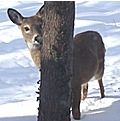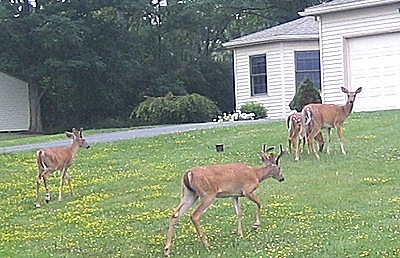- By Dan Veaner
- News
 Print
Print  Village of Lansing Trustees gave the Cornell 'Earn A Buck' (EAB) program permission Monday to conduct a deer hunt on a small parcel of university property that falls within village boundaries. Bow hunting is permitted in the Village, but Cornell is required to ask permission to hunt on their land each year. Cornell Extension Department of Natural Resources Associate Jay Boulanger, who administers the EAB program and helps administer the Village's own deer population control program, reported on his program's goals and progress.
Village of Lansing Trustees gave the Cornell 'Earn A Buck' (EAB) program permission Monday to conduct a deer hunt on a small parcel of university property that falls within village boundaries. Bow hunting is permitted in the Village, but Cornell is required to ask permission to hunt on their land each year. Cornell Extension Department of Natural Resources Associate Jay Boulanger, who administers the EAB program and helps administer the Village's own deer population control program, reported on his program's goals and progress."We're not really that concerned with the number of deer taken," Boulanger told Village Trustees Monday. "We're concerned with the impacts that the deer are causing upon us as we look at deer/vehicle collisions, incidents of lime disease, and whether we or not can grow an oak or a maple tree again. As soon as we see recovery of some biodiversity we know we're approaching a population level, but despite our best efforts we are not there yet."
EAB hunters are strictly regulated on the property. They are limited to a small number and must sign in and out when they hunt there. They are required to carry a Cornell-issued permit as well as their DEC-issued deer tags. Only white tail deer are hunted, with some exceptions. Tree stands and ground blinds are allowed by the program.
Last year the program harvested 165 deer between October 1 and December 18 and in an extended January 12–30 deer management 'focus area' season allowed by the NYS Department of Environmental Conservation (DEC) last year. A 'focus area' season not only extends deer hunting season, but also allows hunters to take an unlimited number of deer, with a cap of two per day. The EAB program harvested 91 does, 44 fawns (27 female), and 30 bucks last year. Cornell does allow firearms on some of its properties outside of the Village of Lansing.
67 deer were taken in the same period in the Village-run population control program that Cornell Professor Bernd Blossey heads. That program provides hunters on private properties if the property owners give permission for a hunt. 8 or 9 additional village deer were taken on a property outside the Village program but subject to Village permission last year, raising the total to about 75. The Village's program also benefitted from the 'focus area' season.
"That worked to our benefit, because without that Deer Management Focus Area we would have taken 47 deer last year," Boulanger. "That would have been a decrease from the year before. But we did pick up an extra 18 deer during that late January season. That will be happening again this year."
Blossey and Boulanger continue to go door to door obtaining permissions, and have had some success in recent years in increasing the area that can be hunted. But they have been unable to obtain permission to hunt on Sundown Farms in the north west portion of the Village, which Boulanger says is virtually a deer reserve with an estimated 100 deer safely congregating there. Trustee and Deputy Mayor Lynn Leopold noted that only three of the properties participating in the Village program yielded more than a couple of deer.
While the number of deer taken at Cornell and in the Village are encouraging, they are still not sufficient to stem the damage to local property and reduce the herd to healthy sustainable levels.
"It should be around 100 or a little more," said Mayor Donald Hartill.
But he added that deer/vehicle accidents were down in the Village last year, suggesting the program is beginning to have some impact.
"It's decreased a lot," Hartill said. "It was 10 or 12 compared to the 30 or 35 we used to get."
Boulanger says he would have to look at statistics, but the reduction of deer/automobile collisions probably is due, in part, to the deer population control programs. He said that the winters have been stable over the past few years, which means that unusually harsh weather has not decreased the population. That suggests the deer hunting programs have had some effect.

The Cayuga Heights population control program has maintained a much higher profile in the Tompkins County community, taking a different approach from the Village of Lansing. Over last winter Cayuga Heights sterilized around 140 deer. About 15 were hit by cars there.
Cayuga Heights has also given funding to the Cornell deer program that will enable them to sterilize ten deer this year instead of just four. Cornell's sterilization program is more costly than Cayuga Heights because of more stringent procedures, but Boulanger says they are lowering some costs this year by using some of the village's techniques, for instance using local anesthesia instead of general anesthesia. Boulanger says that over time the program will help control the population.
"Just from peoples' observations they had tulips this year in some places (in Cayuga Heights) where they haven't seen them in years," Leopold said.
The state is considering allowing crossbow hunting state-wide through all hunting seasons, but Boulander reported that it was not voted on before the legislature recessed. Last year Village trustees discussed whether or not to allow cross-bow hunting if it is enacted by the state. It is illegal to discharge a firearm in the Village.
Village officials have noted in the past that localized deer population control programs are less effective than regional efforts, because the deer think nothing of crossing municipal boundaries. Blossey says more properties are needed within the Village for its program to make an effective impact. Leopold said she hopes he will be available to report to the trustees at their next meeting.
v9i29



